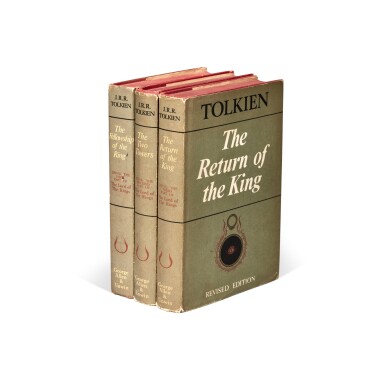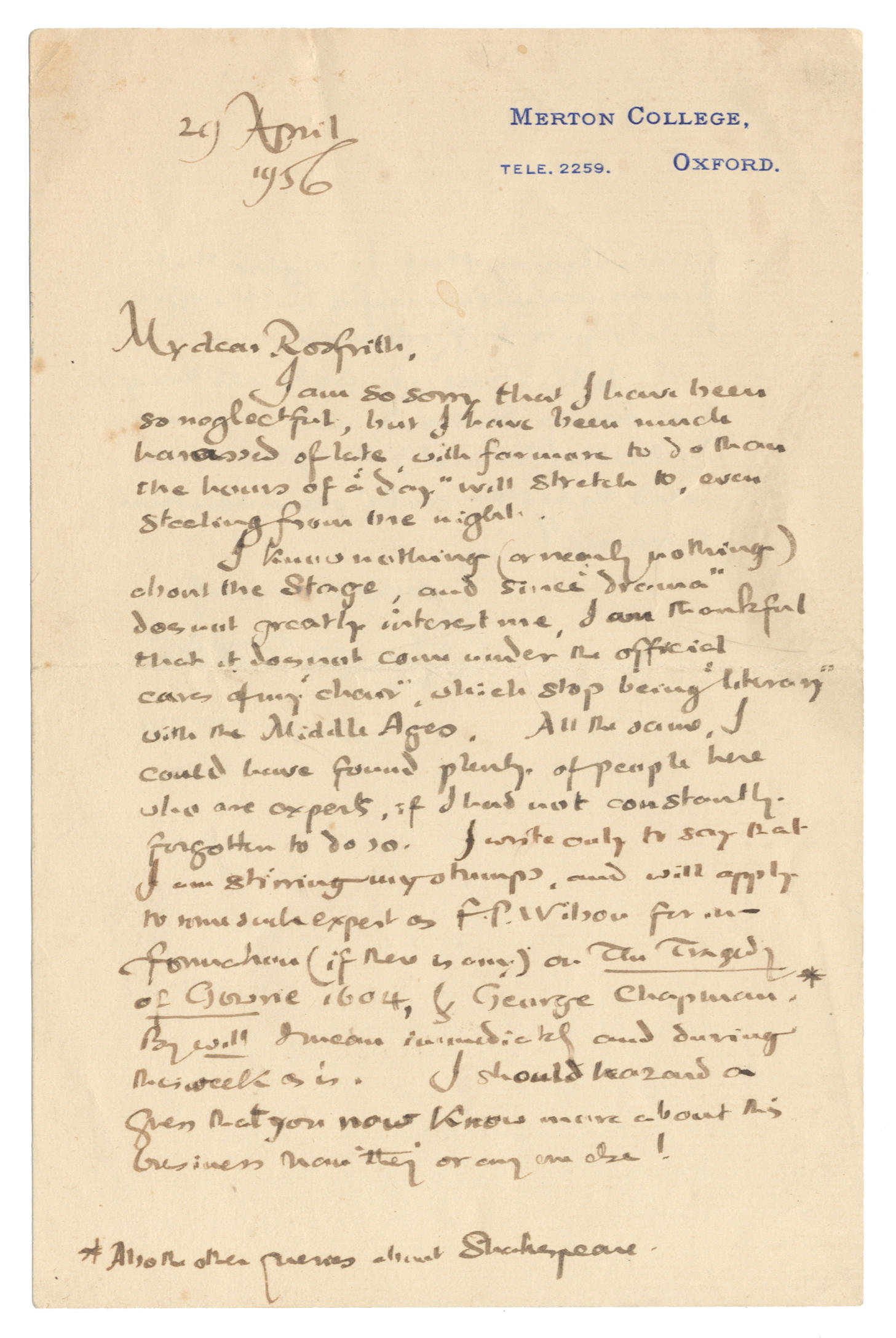J.R.R. Tolkien
Autograph letter signed, to Arthur Humphry House, dated 16 May 1952, headed stationery of Merton College, Oxford, watermarked “Original Broadwall Mill”, 4 pages, 8vo, previously folded
[with:] Handwritten invitation, addressed to “Mr. and Mrs. House”, from “J.R.R. Tolkien and F.P. Wilson”, Friday 11 March, 5.30-7 (no year), punch hole to upper left corner
A SUBSTANTIAL AUTOGRAPH LETTER SIGNED, FRESH TO THE MARKET, SHOWING HOW TOLKIEN APPROACHED THE CHALLENGES OF ACADEMIC ADMINISTRATION ACCORDING TO THE SAME EXACTING STANDARDS AS THE COMPOSITION OF HIS LITERARY WORKS.
By the 1950s, Tolkien’s reputation as the author of The Hobbit was well established, whilst he boasted a senior academic position at the University of Oxford as Merton Professor of English Language and Literature. Nonetheless, in the Spring of 1952, he wrangled with skeptical editors at Collins, who, put off by the epic length of Tolkien's latest literary forays into the world of Middle Earth, declined to publish both The Lord of the Rings and The Silmarillion. As this letter reveals, at this point in time Tolkien was also in the midst of a parallel struggle to cajole his colleagues into supporting overdue academic syllabus reforms.
Addressed to Arthur Humphry House (1908-1955), Senior Research Fellow at Wadham College, the letter responds to Tolkien's recent cancellation of a “F.M.” (Faculty Meeting) after a period of “serious reflection”. He notes that “By the date fixed (3/5/42) less than ⅓ of the Faculty had troubled to send in any proposals for lectures”, making it impossible for him to “present... an ordered list of proposals”. Whilst in Middle Earth the races of Men, Elves, and Dwarves meet without a summons to decide the fate of the One Ring at the Council of Elrond, in the real-life realm of academia Tolkien finds it challenging to gain consensus from his colleagues at a Faculty Meeting!
A stalwart of the Oxford English Faculty, Tolkien spent his career within a department divided between the cliques of English "Lang." and English "Lit."—a longstanding ideological division fuelled by personal animosities and strong, egotistical, characters. The letter notes with disapproval that “a great many of the proposals” put forward for discussion were “medieval and linguistic”, implicitly criticising those in the “Lit.” camp for refusing to engage with the programme of the committee. Tolkien complains about colleagues using Faculty Meetings as occasion for “mere gas-outlet, and emotional reactions” and concludes that he does “not at moment, feel frightfully pleased with Faculty of English”.
Tolkien here shows himself to be dedicated to the idea of modernising the undergraduate syllabus (“As for the second item of “business: the Preliminary. I think that it is important. The whole exam (Ling. and Lit.) needs an overhaul”) and is receptive to emerging talents in the Faculty. The two individuals he entrusts to send in “some considered proposals for the alteration of the Prelim.” are House (a precocious young Dickens scholar) and “Miss Gardner” (i.e. Dame Helen Gardner, who published the first of her acclaimed editions of Donne in 1952). Gardner went on to enjoy a long and glittering academic career, culminating in her appointment as the first female Merton Professor of English Literature, whereas House never had the chance to realise his full potential as a scholar, tragically dying when still in his mid-forties.
PROVENANCE:Family of Arthur Humphry House, by direct descent
J.R.R. Tolkien
Autograph letter signed, to Arthur Humphry House, dated 16 May 1952, headed stationery of Merton College, Oxford, watermarked “Original Broadwall Mill”, 4 pages, 8vo, previously folded
[with:] Handwritten invitation, addressed to “Mr. and Mrs. House”, from “J.R.R. Tolkien and F.P. Wilson”, Friday 11 March, 5.30-7 (no year), punch hole to upper left corner
A SUBSTANTIAL AUTOGRAPH LETTER SIGNED, FRESH TO THE MARKET, SHOWING HOW TOLKIEN APPROACHED THE CHALLENGES OF ACADEMIC ADMINISTRATION ACCORDING TO THE SAME EXACTING STANDARDS AS THE COMPOSITION OF HIS LITERARY WORKS.
By the 1950s, Tolkien’s reputation as the author of The Hobbit was well established, whilst he boasted a senior academic position at the University of Oxford as Merton Professor of English Language and Literature. Nonetheless, in the Spring of 1952, he wrangled with skeptical editors at Collins, who, put off by the epic length of Tolkien's latest literary forays into the world of Middle Earth, declined to publish both The Lord of the Rings and The Silmarillion. As this letter reveals, at this point in time Tolkien was also in the midst of a parallel struggle to cajole his colleagues into supporting overdue academic syllabus reforms.
Addressed to Arthur Humphry House (1908-1955), Senior Research Fellow at Wadham College, the letter responds to Tolkien's recent cancellation of a “F.M.” (Faculty Meeting) after a period of “serious reflection”. He notes that “By the date fixed (3/5/42) less than ⅓ of the Faculty had troubled to send in any proposals for lectures”, making it impossible for him to “present... an ordered list of proposals”. Whilst in Middle Earth the races of Men, Elves, and Dwarves meet without a summons to decide the fate of the One Ring at the Council of Elrond, in the real-life realm of academia Tolkien finds it challenging to gain consensus from his colleagues at a Faculty Meeting!
A stalwart of the Oxford English Faculty, Tolkien spent his career within a department divided between the cliques of English "Lang." and English "Lit."—a longstanding ideological division fuelled by personal animosities and strong, egotistical, characters. The letter notes with disapproval that “a great many of the proposals” put forward for discussion were “medieval and linguistic”, implicitly criticising those in the “Lit.” camp for refusing to engage with the programme of the committee. Tolkien complains about colleagues using Faculty Meetings as occasion for “mere gas-outlet, and emotional reactions” and concludes that he does “not at moment, feel frightfully pleased with Faculty of English”.
Tolkien here shows himself to be dedicated to the idea of modernising the undergraduate syllabus (“As for the second item of “business: the Preliminary. I think that it is important. The whole exam (Ling. and Lit.) needs an overhaul”) and is receptive to emerging talents in the Faculty. The two individuals he entrusts to send in “some considered proposals for the alteration of the Prelim.” are House (a precocious young Dickens scholar) and “Miss Gardner” (i.e. Dame Helen Gardner, who published the first of her acclaimed editions of Donne in 1952). Gardner went on to enjoy a long and glittering academic career, culminating in her appointment as the first female Merton Professor of English Literature, whereas House never had the chance to realise his full potential as a scholar, tragically dying when still in his mid-forties.
PROVENANCE:Family of Arthur Humphry House, by direct descent














Testen Sie LotSearch und seine Premium-Features 7 Tage - ohne Kosten!
Lassen Sie sich automatisch über neue Objekte in kommenden Auktionen benachrichtigen.
Suchauftrag anlegen